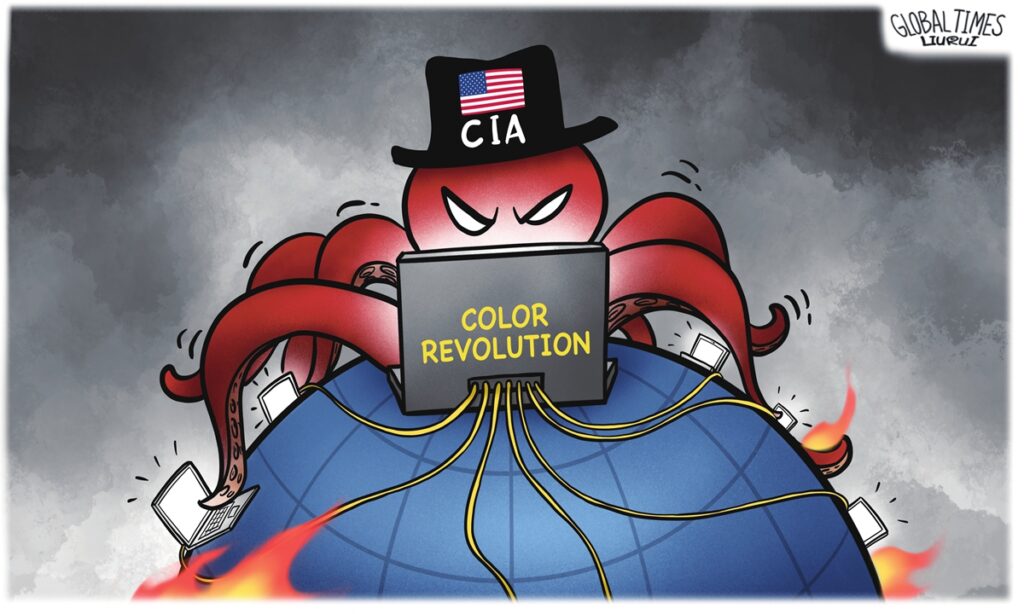Expectedly, the US State Department has expressed “concerns” about China’s counter-espionage work. After the first article entitled “Countering espionage requires the mobilization of all members of society” was published on the official WeChat account of China’s Ministry of State Security (MSS), some foreign media outlets and their reporters have deliberately misinterpreted it. They misrepresented a line in the article “the mobilization of all members of society” as meaning “all the people are looking for spies.” The US State Department has stepped in, further badmouthing China over “arbitrary arrest and detention.” Some netizens argue that every country has counterespionage laws and actions, why do they only express “concerns” about China?
In fact, anyone who has read the article would never come to the conclusion that China wants to “mobilize members of society to monitor and report each other.” So, what does the US State Department want to express with these “concerns”? From the approval of China’s amended Counter-Espionage Law to its implementation, the US and West have been hyping and discrediting it from two fixated perspectives. The first is to carry out targeted smearing with ideological overtones, and shape the legitimate behavior of China’s counter-espionage in the direction of the so-called “mutual surveillance” and “everyone is in danger.” Second, they exaggerate the law’s influence on foreign business and investment, and create a discourse trap that put counter-espionage work in contradiction with China’s efforts to attract foreign investment and open up to the outside world. There is no lack of motivation behind it to serve their purpose of “decoupling from China.”
In addition, their high level of attention to China’s counter-espionage activities may be attributed to a sense of guilt. It is well-known that the US engages in rampant espionage activities, particularly targeting China. The CIA director, William Burns, recently publicly claimed that the US has made “progress” in rebuilding its spy network in China, which is quite arrogant. This is also why the situation in China’s struggle against espionage is described as “severe and complex.” In this situation, in order to safeguard national security and defend national interests, it is necessary to require China to strengthen counter-espionage efforts. Enhancing the public’s awareness of counter-espionage is an indispensable aspect of this.
Where there are spies, there will be counter-spies. China is increasingly emphasizing counter-espionage and counter-infiltration work, which is completely legitimate defense, but it makes those who have done something wrong feel anxious and angry. One person, who used to be a journalist stationed in China and is now the head of a consulting company, exaggeratedly said, “This literally sent chills down my spine” and “Devastating.” The US media quoted his words to create a terrifying atmosphere around China’s counter-espionage efforts. However, if you haven’t done anything wrong, why would you be scared like that? There are generally only three possibilities: intentionally sensationalizing, suffering from paranoid delusions, or engaging in suspicious behavior.
Another well-known situation is that the US’ counter-espionage work is truly alarming, causing panic and suspicion among the people. In recent years, many international students, businesspersons, and scientists have been labeled as “spies” and imprisoned by the US security agencies simply because they are of Chinese descent or have had dealings with China, with most cases lacking substantial evidence. Washington, shrouded in the shadow of new McCarthyism, truly “sends chills down people’s spines.” As a responsible major power, China will never adopt such practices like the US.
Maintaining national security is an obligation that every citizen is required to fulfill according to the constitution, which does not mean conducting a “mass movement” to “encourage all the people to look for spies.” There is a fundamental difference between the two. In reality, any country requires the broad participation of the society in counter-espionage efforts. The MSS published its first article on August 1, the day it opened its official WeChat account, which has been heavily smeared by the overseas public opinion. On August 2 and 3, the account published two more articles respectively entitled “Punishing espionage according to the law and respecting and safeguarding human rights are equally important” and “What should citizens and organizations do when discovering espionage activities? – Answers from the responsible officials of the Ministry of State Security (Part 1).” Following this rhythm, it is estimated that there will be more related articles in the future, serving as a platform for interaction and communication between the MSS and the public.
It is necessary to emphasize that only by reading these articles together can we have a more comprehensive and accurate understanding of China’s counter-espionage work. The first article proposes a nationwide mobilization, while the second article emphasizes the need to strictly regulate law-enforcement activities. The third article provides specific guidance for public participation in counter-espionage work. If we selectively quote and misinterpret certain expressions in a single article, it can only be understood as having ulterior motives. We believe that such malicious attempts to confuse the public will be debunked through the dynamic practice of China’s counter-espionage work and its simultaneous commitment to openness and mutual assurance.
(Global Times)




